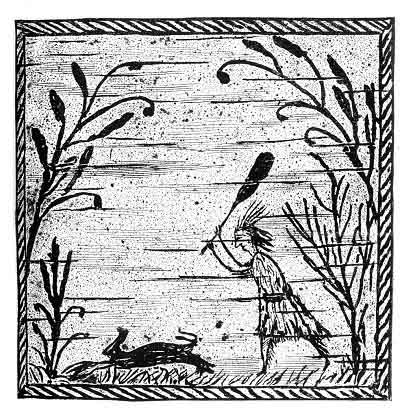
Sacred Texts Native American Northeast Index Previous Next

Now the great lord Glooskap, who was worshiped in after-days by all the Wabanaki, or children of light, was a twin with a brother. As he was good, this brother, whose name was Malsumsis, or Wolf the younger, was bad. Before they were born, the babes consulted to consider how they had best enter the world. And Glooskap said, "I will be born as others are." But the evil Malsumsis thought himself too great to be brought forth in such a manner, and declared that he would burst through his mother's side. 1 And as they planned it so it came to pass. Glooskap
as first came quietly to light, while Malsumsis kept his word, killing his mother.
The two grew up together, and one day the younger, who knew that both had charmed lives, asked the elder what would kill him, Glooskap. Now each had his own secret as to this, and Glooskap, remembering how wantonly Malsumsis had slain their mother, thought it would be misplaced confidence to trust his life to one so fond of death, while it might prove to be well to know the bane of the other. So they agreed to exchange secrets, and Glooskap, to test his brother, told him that the only way in which he himself could be slain was by the stroke of an owl's feather, 1 though this was not true. And Malsumsis said, "I can only die by a blow from a fern-root."
It came to pass in after-days that Kwah-beet-a-sis, the son of the Great Beaver, or, as others say, Miko the Squirrel, or else the evil which was in himself, tempted Malsumsis to kill Glooskap; for in those days all men were wicked. So taking his bow he shot Ko-ko-khas the Owl, and with one of his feathers he struck Glooskap while sleeping. Then he awoke in anger, yet craftily said that it was not by an owl's feather, but by a blow from a pine-root, that his life would end.

GLOOSKAP KILLING HIS BROTHER, THE WOLF
Then the false man led his brother another day far into the forest to hunt, and, while he again slept, smote him on the head with a pine-root. But Glooskap arose unharmed, drove Malsumsis away into the woods, sat down by the brook-side, and thinking aver all that had happened, said, "Nothing but a flowering rush can kill me." But the Beaver, who was hidden among the reeds, heard this, and hastening to Malsumsis told him the secret of his brother's life. For this Malsumsis promised to bestow on Beaver whatever he should ask; but when the latter wished for wings like a pigeon, the warrior laughed, and scornfully said, "Get thee hence; thou with a tail like a file, what need hast thou of wings?"
Then the Beaver was angry, and went forth to the camp of Glooskap, to whom he told what he had done. Therefore Glooskap arose in sorrow and in anger, took a fern-root, sought Malsumsis in the deep, dark forest, and smote him so that he fell down dead. And Glooskap sang a song over him and lamented.
The Beaver and the Owl and the Squirrel, for what they did and as they did it, all come again into these stories; but Malsumsis, being dead, was turned into the Shick-shoe mountains in the Gaspe peninsula.
For this chapter and parts of others I am indebted to the narrative of a Micmac Indian, taken down by Mr. Edward Jock; also to another version in the Rand MS. The story is, in the main-points, similar to that given by David Cusick in his History of the
[paragraph continues] Six Nations, of Enigorio the Good Mind, and Enigonhahetgea, Bad Mind, to which I shall refer anon.
It is very evident that in this tradition Glooskap represents the Good principle, and Malsumsis, the little wolf,--that is the Wolf who is the Younger, rather than little or small,--the Evil one. Malsum typifies destruction and sin in several of these tales. He will arise at the last day, when Glooskap is to do battle with all the giants and evil beasts of olden time, and will be the great destroyer. Malsum is the Wolf Fenris of this the true Indian Edda.
For a further comment on this birth of the twins and its resemblance to a passage in the Edda, the reader is referred to the notes on the next chapter.
15:1 The reader of Rabelais cannot fail to recall here the remarks of the author as to the extraordinary manner in which it pleased the giant Gargantua to come into the world. The Armenians believe that Christ was born through the right side of the Virgin. The Buddhists say the same of Buddha's birth. (Heth and Moab, London, 1883.) Another and as I believe the correct account declares that Malsum the Wolf was born from his mother's armpit.
16:1 There are different readings of this incident. In Mr. Rand's manuscript the alleged means of Glooskap's death is described as being a cat-tail flag (haw-kwee-usqu', Passamaquoddy), while a handful of bird's down is the bane of Malsum the Wolf. The termination sis is a diminutive, here meaning the younger.